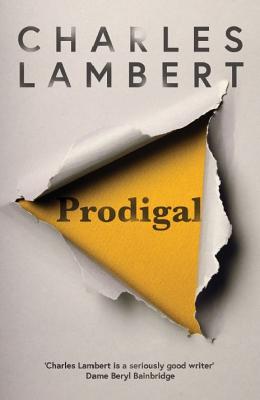 PRODIGAL
PRODIGAL
by Charles Lambert
Aardvark Bureau. 390 pages, $15.95
IN CHARLES LAMBERT’S latest novel, Prodigal, the mother of protagonist Jeremy Eldritch is reading Sybille Bedford’s ironically titled novel A Favourite of the Gods, in which one of the characters exclaims: “Oh, shall we never escape the muddling consequences of our family history?” This question might well be posed by any of Lambert’s major characters, for Prodigal explores the toxic relationships within the Eldritch family: Jeremy, his sister Rachel, and their divorced mother and father, Vanessa and Reginald.
The novel opens in the summer of 2012 when the middle-aged Jeremy, the gay prodigal son who has been living in Paris and writing soft-core porn for the past 35 years, returns to the family home in the seaside town of Whitstable, Kent, to be present at the death of his father. His mother died in Greece in 1985, and he lost his first lover to AIDS in the early 1980s. Death hovers over this powerful novel.
Prodigal is difficult to classify, as it successfully incorporates the forms and tropes of several genres. It’s an artful hybrid of parable (as the title signifies), a Freudian family romance, a Gothic tale, and a Künstlerroman in the tradition of James Joyce’s Portrait of the Artist as a Young Man. In the biblical parable of the Prodigal Son, the son leaves home, leads a lavish and extravagant life, and makes a repentant return. In contrast, Jeremy’s role as prodigal son (a label Rachel pins on him) is ironic, since his life in exile in Paris is anything but lavish—he lives in a tiny flat in the seventeenth arrondissement—and his return is certainly not repentant: “The last thing he needs to hear about is a fatted calf and a deathbed reconciliation.” His hatred for his father is undiminished, making the novel a kind of mock parable.
It is also a variant on Freud’s family romance. “The liberation of an individual, as he grows up, from the authority of his parents,” wrote Freud in his essay “Family Romance” (1909), “is one of the most necessary though one of the most painful brought about by the course of his development.” Liberation is not what Jeremy’s family fosters. The novel charts the failed efforts of Jeremy and Rachel to “liberate” themselves from the authority of their parents, Jeremy from his father and Rachel from her mother, who Rachel thinks favored her son. Jeremy, who feels “choked by the halter and bit of family,” acknowledges that “I’m not an easy person to love.” Rachel fails to find a replacement for her father in the man she marries. I wasn’t very far into the novel when I was reminded of Philip Larkin’s most famous poem “This Be the Verse,” which opens: “They fuck you up your mum and dad./ They don’t mean to but they do./ They fill you up with the faults they had/ And add some extra, just for you.” Prodigal is a brilliant 390-page expansion of Larkin’s 12-line lyric.
The Gothic element of the story is a variation on the trope of the family haunted by its past, as in Poe’s “Fall of the House of Usher.” At one point Jeremy calls the family home “this house of horrors, because that’s how he sees it. The garden, the kitchen, his mother’s sweet-scented realm, and then, surrounding that, a sort of deadness in which his father and sister have lived, like polyps, in rock, waiting to strike.” (There are also Gothic hints of incest.) The narrative is structured so as to reveal the past events that have determined and damaged the lives of the characters, primarily Jeremy’s and Rachel’s. It’s divided into four parts, the first and last dated 2012, the middle two dated 1985 and 1977. As the narrative delves further and further into the past, family secrets are, as in a Gothic tale, slowly and disturbingly revealed.
Prodigal is also a portrait of the artist as a young and middle-aged gay man, or rather a portrait of an artist manqué. When, after graduating with a degree in French literature, Jeremy fails to get his erotic poems published in major London literary journals, he acquiesces to his mother’s plan to send him to Paris, where for three decades, under the pseudonym Nathalie Gray, he ekes out a meager living writing soft-core pornographic romances for female readers with titles like Love Lashed to the Mast, Knife in the Heart, and Cabins of Passion, Tepees of Desire. After the death of his father, Jeremy announces to his French publisher that he plans to “kill” his alter-ego Nathalie Cray (yet another death) so as to write a “proper novel” about his on-again-off-again relationship with his Paris boyfriend Jean-Paul. “I’ve been manufacturing dirty little books for people who deserve better. It’s time I stopped,” he confesses.
Uncertain whether he will ever find love with Jean-Paul, his only option is to transform the failures of his life into art. The planned novel will, he hopes, redeem his wasted (prodigal) life. Jeremy’s submerged literary ambition is signaled by the epigraph, which comes from the chapter on Nathaniel Hawthorne in D. H. Lawrence’s Studies in Classic American Literature: “And what is romance? Usually a nice little tale where you have everything as you like it, where rain never wets your jacket, and gnats never bite your nose, and it’s always daisy time.” Lawrence’s description of The Scarlet Letter—“a sort of parable, an earthly story with a hellish meaning”—also applies to Prodigal. Lambert deftly combines psychological realism with romance to depict the tensions and conflicts in the Eldritch family.
We are left at the end with the feeling that Jeremy may just pull off what Lambert has done so brilliantly in telling the “horror story” of the Eldritch family romance and the son’s prodigal life. After the liberating death of Jeremy’s father, perhaps a literary descendant of Nathaniel Hawthorne will emerge triumphantly from the cast-off cocoon of Nathalie Cray.
Nils Clausson is emeritus professor of English at the University of Regina (Canada).






Discussion1 Comment
Pingback: Prodigal news | CHARLES LAMBERT